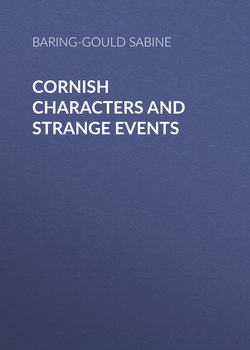Читать книгу Cornish Characters and Strange Events - Baring-Gould Sabine, Baring-Gould Sabine - Страница 1
PREFACE
ОглавлениеCornwall, peopled mainly by Celts, but with an infusion of English blood, stands and always has stood apart from the rest of England, much, but in a less degree, as has Wales. That which brought it into more intimate association with English thought, interests, and progress was the loss of the old Cornish tongue.
The isolation in which Cornwall had stood has tended to develop in it much originality of character; and the wildness of the coast has bred a hardy race of seamen and smugglers; the mineral wealth, moreover, drew thousands of men underground, and the underground life of the mines has a peculiar effect on mind and character: it is cramping in many ways, but it tends to develop a good deal of religious enthusiasm, that occasionally breaks forth in wild forms of fanaticism. Cornwall has produced admirable sailors, men who have won deathless renown in warfare at sea, as "Old Dreadnought" Boscawen, Pellew, Lord Exmouth, etc., and daring and adventurous smugglers, like "The King of Prussia," who combined great religious fervour with entire absence of scruple in the matter of defrauding the king's revenue. It has produced men of science who have made for themselves a world-fame, as Adams the astronomer, and Sir Humphry Davy the chemist; men who have been benefactors to their race, as Henry Trengrouse, Sir Goldsworthy Gurney, and Trevithick. It has sent forth at least one notable painter, the miner's boy Opie, and a dramatist, Samuel Foote, and a great singer in his day, Incledon. But it has not given to literature a great poet. Minor rhymes have been produced in great quantities, but none of great worth. Philosophers have issued from the mines, as Samuel Drew, eccentrics many, as Sir James Tillie, John Knill, and Daniel Gumb. And Cornwall has contributed a certain number of rascals – but fewer in number than almost any other county, if we exclude wreckers and smugglers from the catalogue of rascality.
Strange superstitions have lingered on, and one very curious story of a girl fed for years by fairies has been put on record.
It is somewhat remarkable that Cornwall has produced no musical genius of any note; and yet the Cornishman is akin to the Welshman and the Irishman.
Cornwall has certainly sent up to London and Westminster very able politicians, as Godolphin, Sir William Molesworth, and Sir John Eliot. It furnished Tyburn with a victim – Hugh Peters, the chaplain of Oliver Cromwell, a strange mixture of money-grasping, enthusiasm, and humour.
It has been the object of the author, not to retell the lives of the greatest of the sons of Cornwall, for these lives may be read in the Dictionary of National Biography, but to chronicle the stories of lesser luminaries concerning whom less is known and little is easily accessible. In this way it serves as a companion volume to Devonshire Characters; and Cornwall in no particular falls short of Devonshire in the variety of characters it has sent forth, nor are their stories of less interest.
The author and publisher have to thank many for kind help: Mr. Percy Bate, Mr. T. R. Bolitho, Rev. A. T. Boscawen, Mr. J. A. Bridger, Mr. T. Walter Brimacombe, Mr. A. M. Broadley, Mr. R. P. Chope, Mr. Digby Collins, Mr. J. B. Cornish, Mrs. Coryton of Pentillie Castle, Miss Loveday E. Drake, Mr. E. H. W. Dunkin, f. s.a., Mr. J. D. Enys of Enys, the Rev. Wm. Iago, Mrs. H. Forbes Julian, Mrs. de Lacy Lacy, the Rev. A. H. Malan, Mr. Lewis Melville, Mr. A. H. Norway, Captain Rogers of Penrose, Mr. Thomas Seccombe, Mr. Henry Trengrouse, Mr. W. H. K. Wright, and Mr. Henry Young of Liverpool – and last, but not least, Miss Windeatt Roberts for her admirable Index to the volume.
The publisher wishes me to say that he would much like to discover the whereabouts of a full-length portrait of Sir John Call, with a view of Bodmin Gaol in the background.
S. BARING-GOULD.
